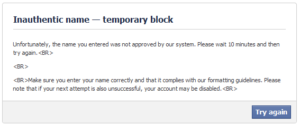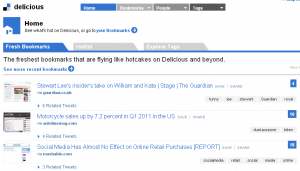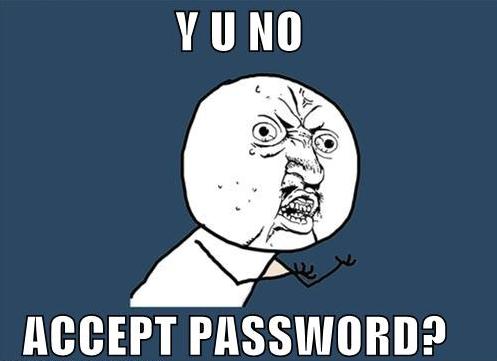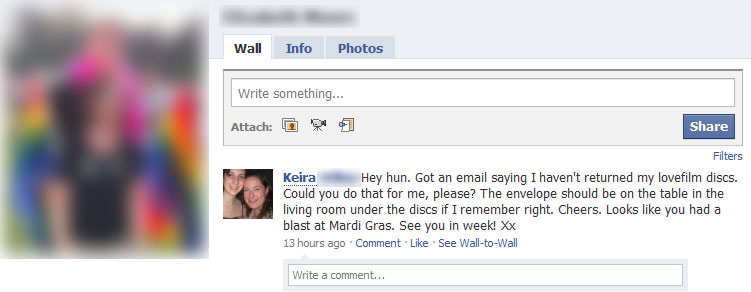Well, that was a farce.
tl;dr: [skip to the end] I’m closing my Facebook account. I’ve got some suggestions at the bottom of this post about how you might like to keep in touch with me in future, if you previously liked to do so via Facebook.
The Backstory
A little over three weeks ago, I was banned from Facebook for having a fake name. This surprised me, because I was using my real name – it’s an unusual name, but it’s mine. I was interested to discover that Claire, who shares my name, hadn’t been similarly banned, so it seems that this wasn’t part of some “sweep” for people with one-letter names, but instead was probably the result of somebody (some stranger, I’d like to hope) clicking the “Report this as a fake name” link on my profile.
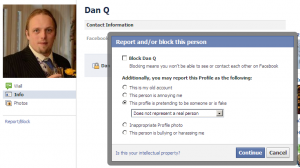
There are many, many things about this that are alarming, but the biggest is the “block first; ask questions later” attitude. I wasn’t once emailed to warn me that I would be banned. Hell: I wasn’t even emailed to tell me that I had been banned. It took until I tried to log in before I found out at all.
The Problem
I don’t make much use of Facebook, really. I cross-post my blog posts there, and I keep Pidgin signed in to Facebook Chat in case anybody’s looking for me. Oh, and I stalk people from my past, but that’s just about the only thing I do on it that everybody does on it. I don’t really wallpost, I avoid internal messages (replying to them, where possible, by email), and I certainly don’t play fucking FarmVille.

So what’s the problem? It’s not like I’d be missing anything if I barely use it anyway? The problem is that my account was still there, it’s just that I didn’t have access to it.
That meant that people still invited me to things and sent me messages. My friends are smart enough to know that I won’t see anything they write on their wall, but they assume that if they update the information of a party they’ve Facebook-invited me to that I’ll get it. For example, I was recently at a fabulous party at Gareth and Penny‘s which they organised mostly via Facebook. They’d be forgiven for assuming that when they sent a message to “the guests” – a list that included me – that I would get that message: but no – it fell silently away into Facebook’s black hole.
The Farce(book?)
Following this discovery, here’s how I spent the next three weeks:
- Facebook gave me a form to fill in when I tried to log in, explaining their “Real Names” policy and asking me to fill in my real name and explain “what I use Facebook for” (“Ignoring friends and stalking exes, same as everybody else,” I explained, “Why; what do YOU use Facebook for?”).
- It then asked me to scan and upload some government-issued photographic ID, which I did. It still wouldn’t let me log in, but it promised that somebody would look at my ID soon (and then destroy their copy) and re-enable my account.
- I periodically tried to log in over the next few days, without success: I was to wait, I was told.
- After about a week, I received an email from “Rachel” at Facebook, who explained the “Real Names” policy and asked me to provide my REAL name, and a scan of some photographic ID. I replied to explain that I’d already done this once, but complied with her request anyway.
- Another few days passed, and I still hadn’t heard anything, so I filled in the Contact Forms in the Help section of Facebook, asking to have my request processed by an actual human being. I provided by ID yet again.
- Another few days later, I received an email from “Aoife” at Facebook. It was pretty-much exactly the same as the earlier email from Rachel. I replied to explain that we’d been through this already. I supplied another pile of photo ID, and a few sarcastic comments.

- Another couple of days passed, so I dug up the postal addresses of Facebook’s HQ, and Mark Zuckerberg‘s new Palo Alto house (he’s tried to keep it secret, but the Internet is pretty good at this kind of detective work), and sent each of them a letter explaining my predicament.
- Yet more days passed, and we reached the third week of my ban. I replied to Rachel and Aoife, asking how long this was likely to take.
- Finally, a little over three weeks after the ban was first put in place, it was lifted. I received an email from Aoife:
Hi Dan,
Thanks for verifying your identity. Note that we permanently deleted your attached ID from our servers.
After investigating this further, it looks like we suspended your account by mistake. I’m so sorry for the inconvenience. You should now be able to log in. If you have any issues getting back into your account, please let me know.
Thanks,
Aoife
User Operations
The Resolution
So now, I’m back on Facebook, and I’ve learned something: having a Facebook account that you can’t log in to is worse than not having a Facebook account at all. If I didn’t have one at all, at least people would know that they couldn’t contact me that way. In my situation, Facebook were effectively lying to my friends: telling them “Yeah, sure: we’ll pass on your message to Dan!” and then not doing so. It’s a little bit like digital identity theft, and it’s at least a little alarming.
I’ve learned something else, too: Facebook can’t be trusted to handle this kind of situation properly. Anybody could end up in my situation. Those of you with unusual (real) names, or unusual-looking pseudonyms, or who use fake names on Facebook (and I know that there are at least a dozen of you on my friends list)… or just those of you whose name looks a little bit off to a Facebook employee… you’re all at risk of this kind of lockout.
Me? I was a little pissed off, but it wasn’t the end of the world. But I know people who use Facebook’s “single sign-on” authentication systems to log in to other services. I know people who do some or all of their business through Facebook. Increasingly, I’ve seen people store their telephone or email address books primarily on Facebook. What do you do when you lose access to this and can’t get it back? When there’s nowhere to appeal?
And that’s how I came to my third lesson: I can’t rely on Facebook not to make this kind of fuck-up again. No explanation was given as to how their “mistake” was made, so I can’t trust that whatever human or automated system was at fault won’t just do the same damn dumb thing tomorrow to me or to somebody I know. And personally, I don’t like Facebook to seize control of my account and to pretend to be me. I come full circle to my first realisation – that it would be better not to have a Facebook account at all than to have one that I can’t access – and realise that because that’s liable to happen again at any time, that I shouldn’t have a Facebook account.
So, I’m ditching Facebook.

None of this pansy “deactivation” shit, either – do you know what that actually does, by the way? It just hides your wall and stops new people from friending you: it still keeps all of your information, because it’s basically a scam to try to keep your data while making you think you’ve left. No, I’m talking about the real “permanent deletion” deal.
I’m going to hang around for a few days to make sure I’ve harvested everybody’s email addresses and pushing this post to my wall and whatnot, and then I’m gone.
If you’re among those folks who aren’t sure how to function outside of Facebook, but still want to keep in touch with me, here’s what you need to know:
- I like email! Remember email? I’ve always preferred it to Facebook messages anyway – that’s why I always reply to you by email, where possible. My email address is pretty obvious – it’s my first name @ this domain name – but if that’s too hard for you, just fill in this form to get in touch with me. If you’re up for some security while you’re at it, why not encrypt your email to me.
- I like instant messaging! I may not be on Facebook Messenger any more, but we can still chat! The best way to get me is on Google Talk, but there are plenty of other options too. Here’s how you do it. Or if you’re really lazy, just check at the top of my blog for the little green light and click “Chat to Dan”.
- I like blogging! Want to know what’s going on in my life? I never updated my “wall” anyway except to link to blog posts – you might as well just come look at my blog! Too much like work? Follow my RSS feed and get updated when I post to my blog, or keep an eye on my Twitter, which usually gets links to my new blog posts almost as soon as they go up.
- I like sharing! I’m not on Google Reader any more, but when I find fun things on the Internet that I enjoyed reading, I put them in this RSS feed. Subscribe and see what I’ve been looking at online, or just look at “Dan is Reading…” in the right-hand column of my blog.
- And I’m not opposed to social networking! I’ve just reached the end of my patience with Facebook, that’s all. Look me up on Google+ and I’ll see you over there (They also have a “Real Names” policy, which is still a bit of a problem, but I’m sending them a pre-emptive “Don’t ban me, bro!” email now)!
Ironically, the only Facebook accounts I’ll have now are the once which do have fake names. Funny how they’re the ones that never seem to get banned.
